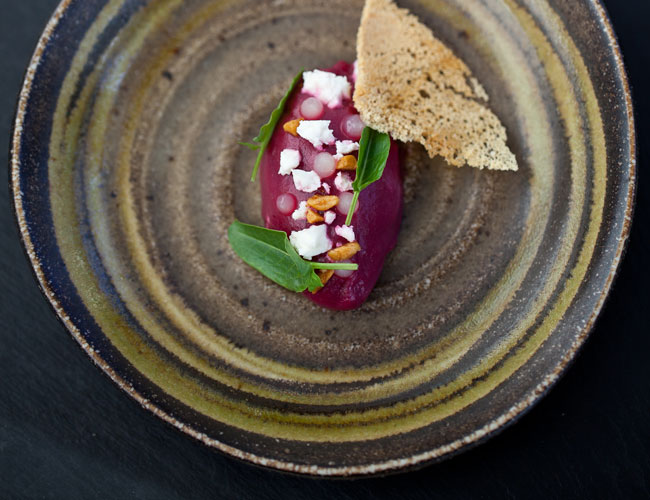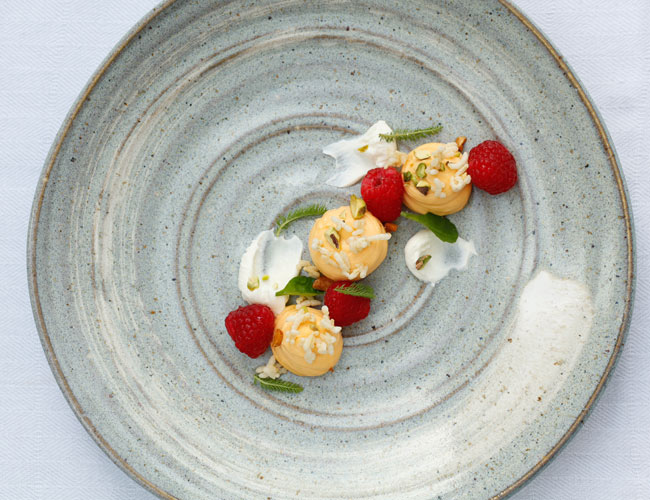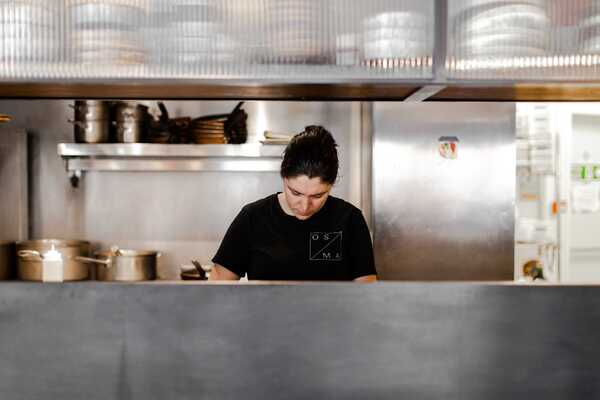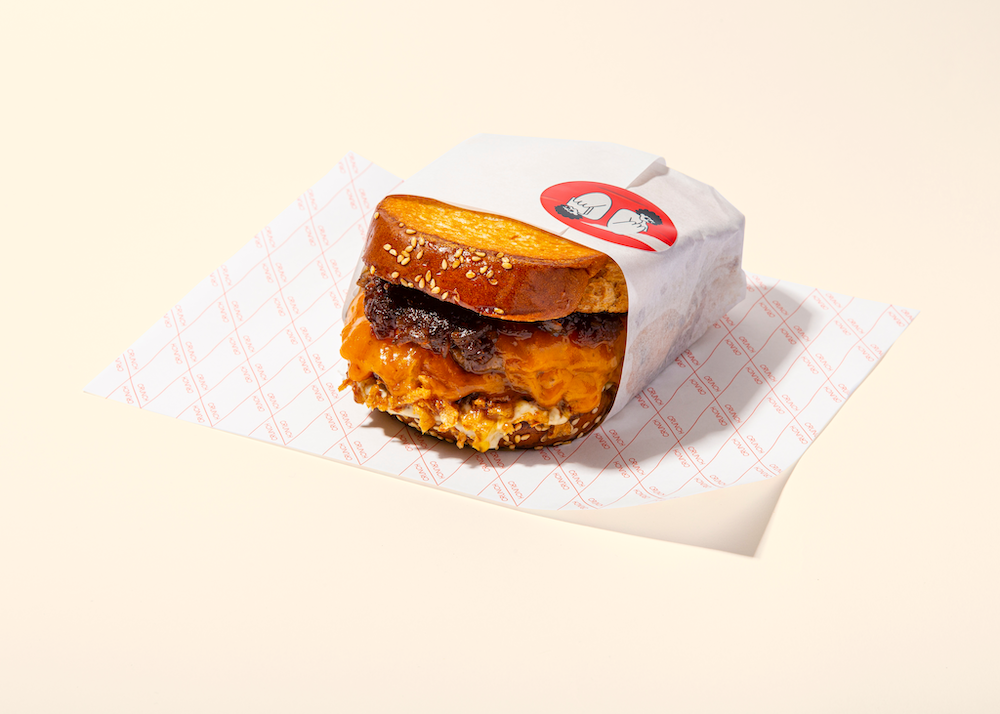Chef profile: Paul Foster at Salt
Itâs 7 February 2017, exactly a year after Paul Foster launched his £100,000 KickStarter campaign to raise funds to open his first restaurant, Salt, in Stratford-upon-Avon, and heâs doing more pacing up and down than a Shakespearean actor on a stage.
âI was hoping to get the keys today,â he says. âI canât switch off because I know itâs imminent, and this restaurant is the biggest step in my career so far. I just want to get in the door.â
Last year, Foster announced that he would be leaving the three-red-AA-star, 31-bedroom Mallory Court in Royal Leamington Spa, Warwickshire, where he had worked as head chef for two years. Just 33 days later, he had raised £102,334 from 605 backers, enough to finally fulfil his dream of owning his own restaurant.
Salt is a joint venture between Foster and his wife, Rhiain, who has a background in business management and HR. The partnership is a different dynamic to the usual chef and general manager â" and itâs clear that Rhiain has no interest in working front of house.
âI sent Rhiain to the Cross at Kenilworth to do a stage, as she had never worked in the industry before. She worked front of house on a Saturday and she hated it!â Foster laughs. âHer strengths lie within business admin, so itâs a good partnership in that way. When I get excited about spending money, she holds the purse strings.â
Working with his nearest and dearest has its obvious benefits, and Foster explains that every decision has been a joint one. âI knew I wanted the restaurantâs name to be one word that was very short and direct â" ideally one syllable. Rhiain and I were skirting around different names and settled on Salt because of how relatable it was to our restaurant and my style, as I salt and brine a lot of my food and want to dry-age meat in-house.â
Deciding on a name was the easy part, though. The journey has been a long and bumpy one. Fosterâs original plan was to open in Leamington Spa â" about 12 miles north-east of Stratford-upon-Avon.
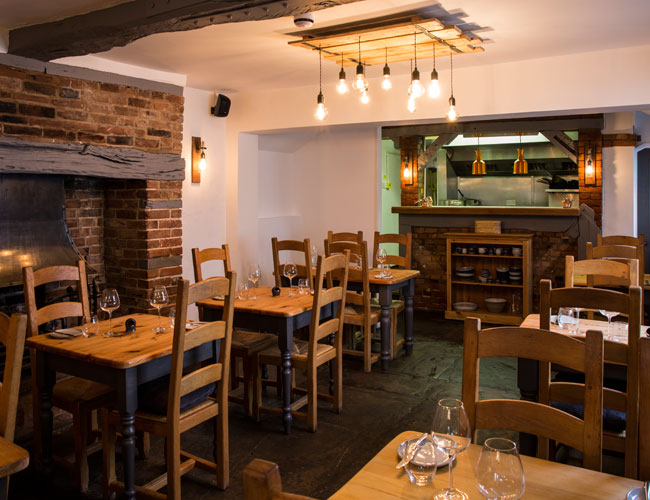
âThe tenant and I had agreed by handshake and email, but then he contacted me a few weeks later and said he might have another offer and asked if Iâd be prepared to wait. I said absolutely not, and I was pretty gutted, but it turned out to be a blessing in disguise because then we found this place.â
The place in question is a 40-cover site, formerly a tapas restaurant, nestled between two beautiful and characteristically wonky 16th-century buildings on Church Street, which is the connecting road between Shakespeareâs birthplace on Henley Street and his funerary monument inside the Holy Trinity church.
Inside, the Grade II-listed building boasts original stone flooring, grand wooden beams and a large fireplace. âItâs got a really homely feel to it,â Foster says. âI love the open kitchen, and although the kitchen itself isnât great, we are going to be adding bits to it as we go along to improve it. Thereâs a garden too, which we arenât 100% sure what we are going to do with yet. I think Iâm going to use part of it for pre-dinner drinks, then for the other half I would like to install a living wall and a couple of raised beds.â
The garden helps Salt to stand out in Stratford, where many of the restaurants are chains. On the iconic Sheep Street, though (which feeds into Church Street), a lot of the restaurants and shops are independently owned.
Independent Salt may be, but Foster doesnât want it to be exclusive. âWe want to be different, but also Iâm conscious that we would get it wrong if we were too fine-dining. It would alienate people. From the beginning I said that I wanted to create something relaxed, so we arenât going to put people off with tablecloths or waiters with a stiff board down their backs.
âWe are in the service industry and often people forget that. We are here to serve people. If you put customers on the back foot and make them feel uncomfortable, then it takes a lot to bring them round.â
As well as the restaurantâs atmosphere and staff being approachable, Foster hopes that he can also offer a competitively priced menu (see box, opposite). Diners will also be able to opt for wine pairings or choose from a list of 30-40 bottles.
âI know we can definitely compete on standards. I donât want to stitch us up and underprice everything, but neither do I want to overprice it as we are a new restaurant. If we have to tweak things then we will; itâs still early days, but the quality is there.â
Fosterâs menu will include dishes similar to those he created at Mallory Court during his time as head chef. âIâm sticking with what Iâve cooked before, partly because Iâve always believed in the food Iâve done and it would be stupid to rip up the rule book and start again. I think it would show a lot of insecurity if I just said, âRight, letâs just change it all and do something differentâ. Yes, I want to evolve, but things I was doing a year ago at Mallory are still relevant, tasty and great. Plus, the team know it, so it means we can start with food I believe in straight away.
âAt Salt itâs going to be ever so slightly stripped back. Iâll be using more humble ingredients and turning them into something gastronomic. With the food at Mallory I sometimes felt that we did more with it than we needed to. For example, we had to do a lot of canapés, whereas here we can just do one or two and really put the effort into them. Itâs about highlighting the ingredients and doing the best you can with them.â
Dishes on the menu will include whole roasted celeriac with yeast cream in beef fat sauce and finished with sorrel, which Foster describes as a âcold and winteryâ dish, and a duck leg tart made of confit duck leg that has been broken down and the fat re-emulsified back through. Itâs then layered with different types of pastry, like a millefeuille, and served with a prune purée cooked in rooibos tea and topped with microplaned butter mushrooms.
âFor the tasting menu dishes will be smaller, as you would expect â" we arenât going to be tight on portion control, but I also donât believe in over-feeding,â says Foster. âThomas Keller sums it up in the best way: you should leave the customer wanting just one more spoonful. I like my dishes to be fresh and light with lots of flavour. When youâre offering a tasting menu it canât be too heavy.â
As Foster mentioned, he is passionate about using salt to dry-cure meat and has installed a glass-fronted fridge packed with Himalayan salt blocks to do exactly that. âWe will have different types of meat in there â" some will be a short ageing and others will be longer, so we will hang sirloins of beef and whole ducks for a few days to get them nice and dry and to intensity the favour,â he explains.
Foster is adamant that he will not compromise on quality to achieve a higher turnover, and so will not be offering any pre-theatre or early bird specials. âThe tourist trade isnât going to be massive for us, and I donât see a point in driving that because the big mid-range markets have it covered. I certainly donât want to affect our product by offering something cheap. We have even chosen a wine supplier that doesnât supply to anyone else in this area, so a lot of our wines will be exclusive to Salt. Thatâs important because a lot of places use the same supplier here and I donât want people to be eating their meal and thinking âthat glass of wine is 50p cheaper down the roadâ.â
Fosterâs high standards come from his background working at top restaurants, including the two-Michelin-starred Belmond Le Manoir aux QuatâSaisons in Great Milton, Oxfordshire; Wylie Dufresneâs Michelin-starred wd~50 in New York; Thomas Kellerâs three-Michelin-starred French Laundry in California; and the two-Michelin-starred Restaurant Sat Bains with Rooms in Nottingham.
Foster started his career at Haigs Hotel in Coventry as a fresh-faced commis, and was thrown in at the deep end in a kitchen with only one other chef. He was tasked with making everything from scratch, from the jam at breakfast to all the bread and ice-creams.
âWorking in a hotel is such a learning curve,â he says. âYoung chefs these days all want to work in the fancy restaurants where the afternoon tea and sandwiches become an afterthought. But I have always thought that those peripheral things not only make you a better chef but are vital to running a good business. As a customer, if you had a crap sandwich, you probably wouldnât come back and spend £60 on dinner would you?â
Over the years, Foster developed his style of cuisine â" seasonal, simple food focused on flavour. He credits Sat Bains as his biggest mentor. âSat taught me how to strip food back to its purity. His palate is the best I have ever known â" he can pick up certain things you wouldnât even realise were there. I still remember everything he taught me,â he says.
Salt will also be following in the footsteps of Restaurant Sat Bains by offering staff reasonable working hours and additional perks, such as live-in accommodation. The restaurant will be open four and a half days a week, offering lunch and dinner from Wednesday to Saturday and lunch on Sundays.
âYou canât work people to the bone any more,â he says. âSince I have been in the industry, working conditions have got a lot better. Now, because itâs so hard to find staff, itâs about what you can offer them â" better standards, staff food, live-in accommodation and time off.â
Alongside Foster there will be two chefs working in the kitchen â" Matthew Gibson and Laura Kimber â"whom he brought from Mallory Court. âI think my experience of being head chef at Tuddenham Mill and Mallory Court helped to prepare me for opening my own venture. If I went from being a sous chef to owning a restaurant, then it definitely would be more of a shock,â he says.
âThe first thing I learnt as head chef is that thereâs no safety net, whereas before there was always someone above me. I would put a dish up for them and they would tweak it a little bit but there was always that final say. Suddenly I was the final say, which was a bit of a shock. It helps you to see what kind of boss youâre going to be.â
Considering Fosterâs glittering past working in Michelin-starred and AA rosette-accredited kitchens, of course he is aiming for accolades at Salt, but first he wants to focus on bedding in and enjoying his new-found freedom.
âIâm not driven by accolades as much as I was in the past because you end up getting disappointed. All I can do is cook my best food. I just believe in learning from other people and keeping customers happy. Yes Iâd love to receive awards, but they come second to running a good business.â
Foster wants to open more restaurants, but will not be crowdfunding again. âWe would like to grow the business with Salt as the flagship. Thereâs a lot of scope in Stratford and in surrounding areas for different types of dining, so there are lots of options for the future,â he concludes.
Paul Foster CV
2017 Chef-patron, Salt, Stratford-upon-Avon
2014-2016 Head chef, Mallory Court, Leamington Spa
2010-2014 Head chef, Tuddenham Mill, Tuddenham, Suffolk
2008-2010 Sous chef, Restaurant Sat Bains with Rooms, Nottingham
2007 Stagiaire, the French Laundry, California
2007 Stagier, wd~50, New York
2004-2005 Chef de partie, Simpsons, Birmingham
2003-2004 Chef de partie Manor Hotel Meriden, Solihull
2002-2003 Commis chef, Belmond Le Manoir aux QuatâSaisons, Great Milton, Oxfordshire
2000-2002 Commis chef, Haigs Hotel, Balsall Common, Coventry
1998-2001 Henley College, Coventry
Salt
8 Church Street
Stratford-upon-Avon
Warwickshire
01789 263566
www.salt-restaurant.co.uk
Covers 40
Opening hours Open for lunch from 12 noon until 2pm, Wednesday to Sunday; open for dinner from 6.30pm until 10pm, Wednesday to Saturday
Average spend Dinner: two courses, £32; three courses, £37; tasting menu, £57. Lunch â" two courses, £15; three courses, £19.50; tasting menu, £35
From the menu
Starters
Slow-cooked salmon, mussel sauce, dill
Glazed pork cheek, Jerusalem artichoke, pickled mushrooms
Salt-baked beetroot, goatsâ curd, lovage emulsion
Mains
Lamb rump, miso-glazed shoulder, barley risotto, Berkswell cheese
Roast cod, Hispi cabbage, beach mushrooms, gentlemanâs relish
Goosnargh duck breast, black garlic, hay-smoked celeriac, crispy kale
Desserts
Yorkshire rhubarb, brioche custard, candied pistachio
Chocolate tart, brown butter ice-cream, lime zest
British cheeses, apple chutney, lavoche bread (can be added as an extra course for £7.50 per head)



